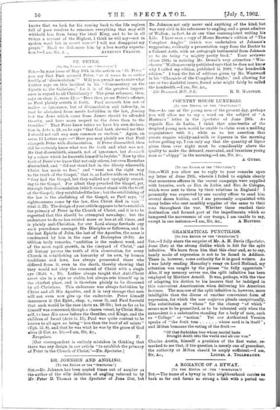ST. PETER.
(To TH1 EDITult OP THE "SPECTATOR.'] SLR,—In your issue of May 10th in the article on "St. Peter" you say that Paul accused Peter, "as it seems to vs rather hastily, of 'dissimulation.'" Will you permit me to state what Luther says on this incident in his "Commentary on the Epistle to the Galatians," for it is of the greatest import- ance in regard to all Christianity ? The great reformer, then, sass on chap. ii., verse 12:—" Here then ye see Peter's offence, as Paul plainly setteth it forth. Paul accuseth him not of Malice or ignorance, but of dissimulation and infirmity, in that lie abstained from meats forbidden in the law, fearing lest the Jews which came from James should be offended thereby, - and have more respect to the .lews than to the Gentiles." That Peter knew better we have his own declara- tion in Acts x. 28, as he says "that God bath slimed me that I should not call any man common or unclean." Again, on verse 13 Luther says :—" Here you may plainly see that Paul chargeth Peter with dissimulation. If Peter dissembled, then did he certainly know what was the truth and what was not. He that dissembleth, sinneth not of ignorance, but deceiceth by a colour which he knoweth himself to befalse." Now by this fault of Peter's we know that not only others, but even Barnabas dissertibled, and "did not stand fast in the liberty wherewith Christ has made us free," and "went not the right way to the truth of the Gospel," that is, as Luther adds on verse 14, "-they had the GoSpel, but they walked not uprightly accord- ing to the Gospel. For albeit they preached the Gospel, yet, through their dissimulation (which cannot stand with the truth of the Gospel), they established the law ; but the establishing of the law is the abolishing of the Gospel, as Paul says, 'if righteousness come by the law, then Christ died in vain ' " (Gal. ii. 21). The design of your article appears to be to establish the primacy of Peter in the Church of Christ, and it is to be regretted that this should be attempted nowadays ; but the endeavour to do so has existed more or less at all times, and is plainly anti-Christian, for our Lord always forebade any such precedence amongst His Disciples or followers, and in the last Epistle of John, the last of the Apostles, the same is condemned by him in the case of Diotrephes (9-10). As Gibbon truly remarks, "ambition is the rankest weed, and of the most rapid growth, in the vineyard of Christ," and all' history proves the truth of this observation, for every Church in establishing an hierarchy of its own, by human traditions at d laws, has always persecuted those who differed from it, even to the death, thereby showing that they would not obey the command of Christ with a single eye (Matt. v., 16). Luther always taught that Anti-Christ never sits in a stye or stable, but always sets himself up in the chiefest place, and is therefore plainly to be discerned by all Christians. This endeavour was always forbidden by Christ and all His Apostles, and it is very strange that men Will not even now give up the endeavour. Peter himself denounces it (1st Epist., chap. v., verse 3), and Paul foretold that such would be the case (Acts ix. 28-30); but as far as he himself was concerned, though a chosen vessel, by Christ Him- self, to bear His name before the Gentiles, and Kings, and the children of Israel (Acts ix. 15), Paul was quite content to be known to all ages as being "less than the least of all saints" (Eph. iii. 8), and that he was what he was by the grace of God alone (1 Cor. xv. 10).—I am, Sir, &c.,
[Our correspondent is entirely mistaken in thinking that there was any design in our article "to establish the primacy of Peter in the Church of Christ."—En. Spectator.]














































 Previous page
Previous page